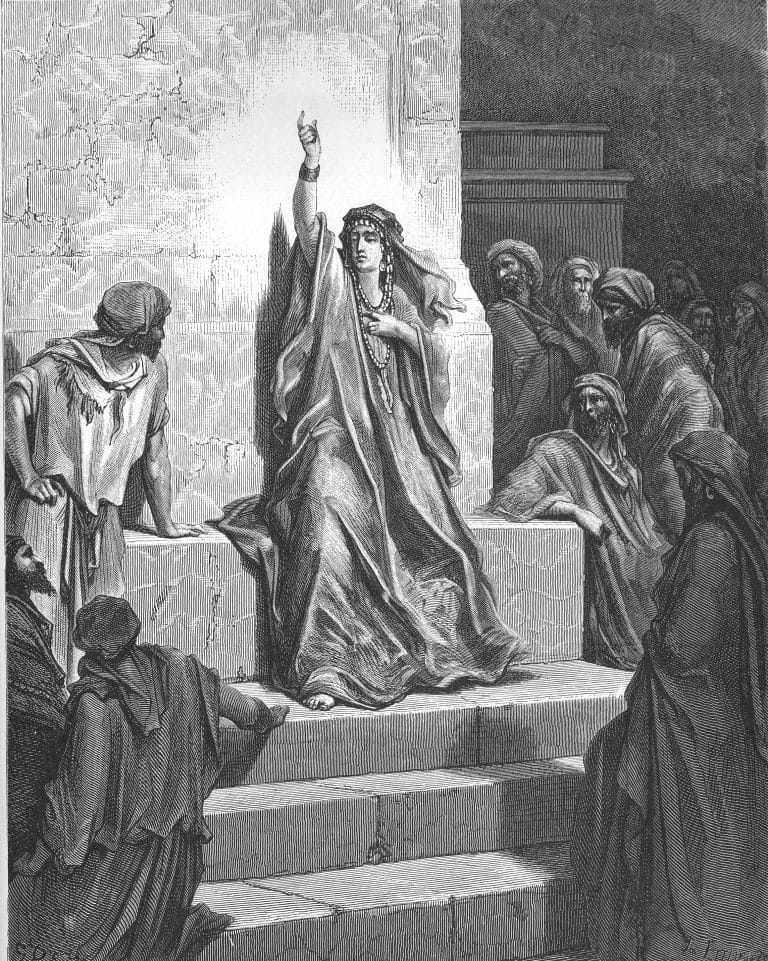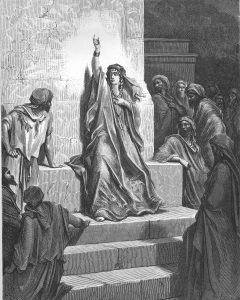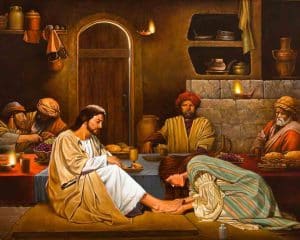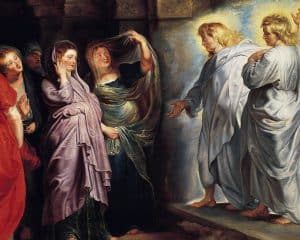I am so excited that I get to post about Deborah. She is one of my favorite women in the scriptures. Her story takes place in Judges 4 & 5.
The time of the Book of Judges was not an easy one for the Jews. They seemed to be caught in a cycle of righteousness and unrighteousness. During the time of Deborah many Jews had given up worshiping the God of Abraham and returned to worshiping Ba’al. Because of their wickedness, they were being oppressed by an army of 900 iron chariots (the equivalent of tanks today), belonging to King Hazor, and led by a man named Sisera.
But Deborah was a wise and righteous Judge of Israel. She would sit in judgment under a palm tree, and the people of Israel would come to her for judgment and advice.
One day, she sent for Barak, who was the commander of the Israelite army. She told him it was time for him to go and take care of Hazor’s army. Barak told her he would only go if she came with him. Without flinching, Deborah agreed, saying, “I will surely go with thee: notwithstanding the journey that thou takest shall not be for thine honor; for the Lord shall sell Sisera into the hand of a woman.”
After a little more urging from Deborah, Barak and his army went and triumphed over Sisera and his iron chariots. Sisera fled to an ally’s camp, where he asked Jael, the king’s wife, to hide him and house him. She agreed. But as he lay sleeping in her tent, she took a tent stake and drove it through his head. When Barak came to search for Sisera, Jael showed him what she had done. Deborah later calls her blessed above women for her actions.
I think there are a couple of lessons to be learned from this story. First, Deborah was a prophetess, a judge, and a military leader. We can argue about what that meant, or what the implications are for the modern church, especially considering that Melchizedek priesthood responsibilities include ‘sitting as a judge in Israel’ (D&C 107). But it is clear: Deborah sets a precedent for women holding real responsibility. The commander of the army even refused to go to war without her there. Imagine that: a man going to a woman for instruction! And him following it! Women are wise and strong, and should be allowed to lead in real and meaningful ways, without having to always answer to men. Women should be allowed to answer only to their God.
Second: Deborah, to me, is a foil for the idealized version of womanhood we generally embrace in Mormon culture. Typically Mormon women are encouraged to be kind, sweet, deferential, and to subsume their identities in motherhood. We do not know if Deborah had children; in Judges 5 she refers to herself as a mother in Israel, but that could be figurative or literal. Her husband’s name is barely mentioned; we know nothing about his profession or lineage. All we know about her is that she was an influential political and military leader. She certainly was not deferring to Barak’s authority when she told him, and I’m paraphrasing here, “Just FYI, this story is not going to be about you, it’s going to be about Jael.” I can guarantee that she wasn’t speaking in primary voice when she told him (in Judges 4:14), “Up; for this is the day in which the Lord hath delivered Sisera into thine hand: is not the Lord gone out before thee?” The same can be said of her calling out the Kings of Israel in chapter five for being slow to come and fight against Hazor’s army.
Deborah represents another way to be a Woman of God. She is strong, decisive, and has a direct link to understanding His will. She led her people out from under the reign of a tyrant, not through manipulation or ‘influence,’ but through direct action. Those more subtle strategies have their place; take the post in this series about Esther for example. However, we miss out when we pigeonhole our Sheroes. We need to see gentle-strong women, and tough-strong women, and all kinds of strong women (and all kinds of weak, bad, sad, righteous, powerful women). Because women in real life are all those things. We miss out when we pigeonhole real women, or worse, when we learn to pigeonhole ourselves.
Save
Save
Save
Save







4 Responses
“Deborah represents another way to be a Woman of God.” Yes! A thousand times yes. Thanks for this excellent reflection on Deborah.
I loved your final reflection, woman in real life are all kinds, like Deborah, Rebekah, Esther, all at the same time. I enjoyed your text. Thank you.
This is excellent, JessR!! I love so many things about this, especially this: “Women should be allowed to answer only to their God.” I am so tired of feeling like my church membership is held by a man who required me to jump through hoops in order to “earn” it. We are all citizens pf Christ, and should be allowed the spiritual freedom to answer for our own beliefs and choices.
Thank you for this beautiful post!
I love Deborah! She’s probably the scriptural woman I admire most. I wish we knew more about her!